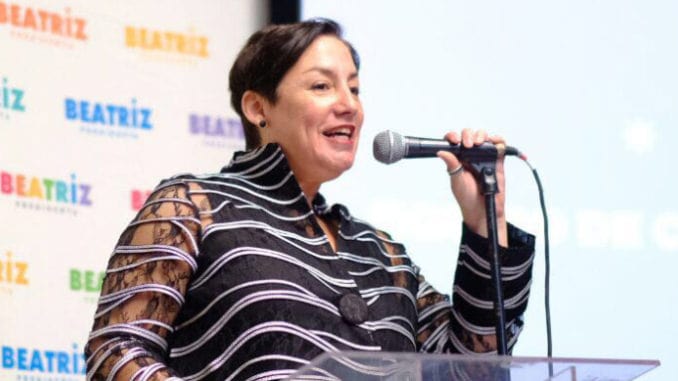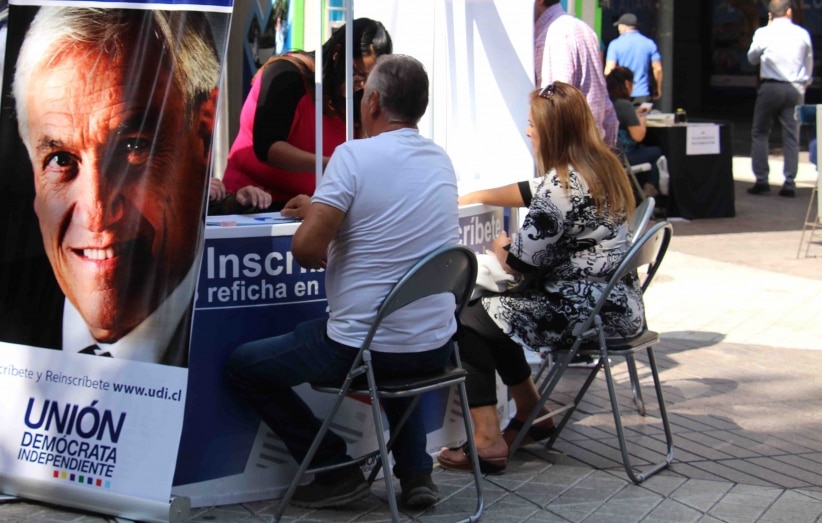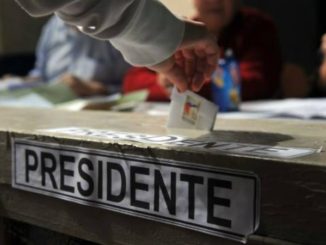
by Tomás Croquevielle / Santiago Times Staff
In the evening of the election a new political force achieved what many tried: raise an alliance of political signifance that could compete with the two major traditional political sectors. A new stage of Chilean politics was entered.
It was 6:00 pm on November 19 in the command of Beatriz Sánchez, in the narrow street Sara del Campo. The big screen was showing the results of 0.21% of the vote in the first round of the elections, and the candidate of the Frente Ampli (FA) obtained 32.6%, starting a tenuous but growing optimism among the people of the command.
With the passing of minutes and hours, as more results were coming in, it became clear that the results far exceeded expectations. Beatriz Sánchez was in fact a direct opponent for Alejandro Guillier, who by some 150.000 votes got to the second round of the presidential elections in Chile. Little by little the supporters of Sanchez and Frente Amplio began to gather, and began to sing, first timidly, but then with more energy, the chants “Let it be heard, “let it be feel, Bea Sánchez for president” and “With strength and hope the FA advances.”
¨Frente Amplio has come to stay!¨
The 19th of November was the first time Chileans abroad could vote, and they chose Sánchez. Around 18:30 pm Claudia Sanhueza, in charge of the platform of the candidate, approached the media and said that with the results that became clear today, the Frente Amplio “had come to stay and transform”. In the meantime different leaders of the political alliance were seen, with cell phone in hand, trying to understand what was happening on the ground, at the polls, all over Chile. They were noticeable nervousness but also enthusiastic and excited.
After 7 pm more flags of the different political colors that make up this new political coalition began to congregate. On the giant screen could be seen how the television channels showed leaders from FA, such as Giorgio Jackson, Miguel Crispi and Gabriel Boric (all of them former student leaders), who had been elected deputees, something that generated a wave of applause. At the same time, they shouted “you are screwed” to Camilo Escalona, traditional figure of the center left, when it was known that he would not be elected. Representing the fall of the figures of the old Concertation of Parties for Democracy, which governed the country during the first two decades after the return to democracy, and the emergence of new leaders that symbolized Chilean progressivism.

Between excitement and frustration
Despite the optimism and satisfaction with the result obtained, there was still a feeling of frustration, the feeling that the media and the polls had campaigned against FA, minimizing its chances of getting a high vote.
Only weeks before the election the polls gave Sanchez around 10% of the votes and the FA a maximum of 9 seats in congress; Sánchez and FA doubled that figure (only 2 percentage points behind Guillier) and the new coalition obtained 20 seats.
Enrique, an FA supporter of about 50 years in the crowd, claimed that some media had not even reported Sanchez’s victory in countries like New Zealand or Germany, where Sanchez clearly won and could push some to vote for him inside the country. “We were left with the feeling that more was possible,” said the BF supporter.
Sebastián Depolo, the head of the campaign of Beatriz Sánchez, took it a step further when around 9PM he took the stand and said that, the only reason the FA has not passed to the second round was because of a media campaign. But also Depolo maintained the optimism and stated that “it was time to be happy and hopeful”.
With the arrival of Sánchez on the stage, around 22:00 PM, she quickly attacked the pollsters, saying that “I want an explanation tomorrow from those who think they are the owners of Chile (…) the election was already run for the owners of Chile “.
“I want an explanation tomorrow from those who think they are the owners of Chile.¨
A new era in Chilean politics
It made up for a night of joy, and although they left third in the presidential and parliamentary election, it seemed that the FA had won the election. In less than a year this new political force achieved what many tried unsuccessfully for more than 25 years, by raising a serious opponent for the two major traditional political sectors, marking a new era in Chilean politics.
The position that the FA will take in the runoff election (December 17) between Sebastian Piñera, the candidate of the right, and the one of the traditional center left, Alejandro Guiller, is still uncertain. In the coalition there is the fear of appearing opportunistic or more of the same if they rush to support Senator Guiller. On November 30, the BF national table will meet to define a unified position for the presidential runoff.
However, its position will be clear: whoever wins, they will be opposition.



